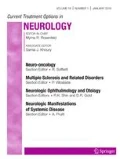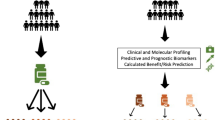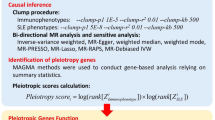Abstract
Purpose of review
This review will examine the current evidence that genetic and/or epigenetic variation may influence the multiple sclerosis (MS) clinical course, phenotype, and measures of MS severity including disability progression and relapse rate.
Recent findings
There is little evidence that MS clinical phenotype is under significant genetic control. There is increasing evidence that there may be genetic determinants of the rate of disability progression. However, studies that can analyse disability progression and take into account all the confounding variables such as treatment, clinical characteristics, and environmental factors are by necessity longitudinal, relatively small, and generally of short duration, and thus do not lend themselves to the assessment of hundreds of thousands of genetic variables obtained from GWAS. Despite this, there is recent evidence to support the association of genetic loci with relapse rate.
Summary
Recent progress suggests that genetic variations could be associated with disease severity, but not MS clinical phenotype, but these findings are not definitive and await replication. Pooling of study results, application of other genomic techniques including epigenomics, and analysis of biomarkers of progression could functionally validate putative severity markers.
Similar content being viewed by others
References and Recommended Reading
Papers of particular interest, published recently, have been highlighted as: • Of importance •• Of major importance
•• International Multiple Sclerosis Genetics C. The multiple sclerosis genomic map: role of peripheral immune cells and resident microglia in susceptibility. BioRxiv 2017; bioRxiv 143933; doi: https://doi.org/10.1101/143933. The prepublication of the largest MS GWAS to date that provides significant information on the heritability of MS.
Lin R, Charlesworth J, van der Mei I, Taylor BV. The genetics of multiple sclerosis. Pract Neurol. 2012;12:279–88.
Sawcer S, Franklin RJ, Ban M. Multiple sclerosis genetics. Lancet Neurol. 2014;13:700–9.
Confavreux C, Vukusic S, Moreau T, Adeleine P. Relapses and progression of disability in multiple sclerosis. N Engl J Med. 2000;343:1430–8.
Signori A, Izquierdo G, Lugaresi A, et al. Long-term disability trajectories in primary progressive MS patients: a latent class growth analysis. Mult Scler 2017:1352458517703800.
Eriksson M, Andersen O, Runmarker B. Long-term follow up of patients with clinically isolated syndromes, relapsing-remitting and secondary progressive multiple sclerosis. Mult Scler. 2003;9:260–74.
Chung KK, Barkhof F, Altmann DR, Miller DH, Chard D. Does ‘benign’ multiple sclerosis exist? A 30-year follow-up study of people presenting with clinically isolated syndrome. Mult Scler. 2017;23:8–84.
Kurtzke JF. Rating neurologic impairment in multiple sclerosis: an expanded disability status scale (EDSS). Neurology. 1983;33:1444–52.
Jokubaitis VG, Spelman T, Kalincik T, et al. Predictors of disability worsening in clinically isolated syndrome. Ann Clin Transl Neurol. 2015;2:1–10.
Jokubaitis VG, Spelman T, Kalincik T, Lorscheider J, Havrdova E, Horakova D, et al. Predictors of long-term disability accrual in relapse-onset multiple sclerosis. Ann Neurol. 2016;80:89–100.
Kalincik T, Vivek V, Jokubaitis V, Lechner-Scott J, Trojano M, Izquierdo G, et al. Sex as a determinant of relapse incidence and progressive course of multiple sclerosis. Brain. 2013;136:3609–17.
Tintore M, Rovira A, Rio J, et al. Defining high, medium and low impact prognostic factors for developing multiple sclerosis. Brain. 2015;138:1863–74.
Kaunzner UW, Gauthier SA. MRI in the assessment and monitoring of multiple sclerosis: an update on best practice. Ther Adv Neurol Disord. 2017;10:247–61.
Disanto G, Barro C, Benkert P, Naegelin Y, Schädelin S, Giardiello A, et al. Serum neurofilament light: a biomarker of neuronal damage in multiple sclerosis. Ann Neurol. 2017;81:857–70.
Roxburgh RH, Seaman SR, Masterman T, et al. Multiple sclerosis severity score: using disability and disease duration to rate disease severity. Neurology. 2005;64:1144–51.
Amato MP, Portaccio E. Clinical outcome measures in multiple sclerosis. J Neurol Sci. 2007;259:118–22.
Lizak N, Lugaresi A, Alroughani R, Lechner-Scott J, Slee M, Havrdova E, et al. Highly active immunomodulatory therapy ameliorates accumulation of disability in moderately advanced and advanced multiple sclerosis. J Neurol Neurosurg Psychiatry. 2017;88:196–203.
Ramanujam R, Hedstrom AK, Manouchehrinia A, et al. Effect of smoking cessation on multiple sclerosis prognosis. JAMA Neurol. 2015;72:1117–23.
Simpson S Jr, der Mei IV, Taylor B. The role of vitamin D in multiple sclerosis: biology & biochemistry, epidemiology and potential roles in treatment. Med Chem. 2017;14:129–43.
Lucas RM, Ponsonby AL, Dear K, Valery PC, Pender MP, Taylor BV, et al. Sun exposure and vitamin D are independent risk factors for CNS demyelination. Neurology. 2011;76:540–8.
Tettey P, Simpson S, Taylor B, Ponsonby AL, Lucas RM, Dwyer T, et al. An adverse lipid profile and increased levels of adiposity significantly predict clinical course after a first demyelinating event. J Neurol Neurosurg Psychiatry. 2017;88:395–401.
• Jokubaitis VG, Butzkueven H. A genetic basis for multiple sclerosis severity: red herring or real? Mol Cell Probes. 2016;30:357–65. An overview of the genetic drivers of progression and phenotype prior to 2015.
Hensiek AE, Seaman SR, Barcellos LF, Oturai A, Eraksoi M, Cocco E, et al. Familial effects on the clinical course of multiple sclerosis. Neurology. 2007;68:376–83.
Van der Walt A, Stankovich J, Bahlo M, et al. Heterogeneity at the HLA-DRB1 allelic variation locus does not influence multiple sclerosis disease severity, brain atrophy or cognition. Mult Scler. 2011;17:344–52.
Masterman T, Ligers A, Olsson T, Andersson M, Olerup O, Hillert J. HLA-DR15 is associated with lower age at onset in multiple sclerosis. Ann Neurol. 2000;48:211–9.
• Pan G, Simpson S Jr, van der Mei I, et al. Role of genetic susceptibility variants in predicting clinical course in multiple sclerosis: a cohort study. J Neurol Neurosurg Psychiatry. 2016;87:1204–11. Describes the methodology of utilising GRS in assocating the risk of MS progression and relapse rate with known MS risk variants.
Graves JS, Barcellos LF, Shao X, Noble J, Mowry EM, Quach H, et al. Genetic predictors of relapse rate in pediatric MS. Mult Scler. 2016;22:1528–35.
Beecham AH, Patsopoulos NA, Xifara DK, et al. Analysis of immune-related loci identifies 48 new susceptibility variants for multiple sclerosis. Nat Genet. 2013;45:1353–60.
IMSGC. Risk alleles for multiple sclerosis identified by a genomewide study. N Engl J Med. 2007;357:851–62.
International Multiple Sclerosis Genetics C, Wellcome Trust Case Control C, Sawcer S, et al. Genetic risk and a primary role for cell-mediated immune mechanisms in multiple sclerosis. Nature. 2011;476:214–9.
Baranzini SE, Wang J, Gibson RA, Galwey N, Naegelin Y, Barkhof F, et al. Genome-wide association analysis of susceptibility and clinical phenotype in multiple sclerosis. Hum Mol Genet. 2009;18:767–78.
•• Zhou Y, Graves JS, Simpson S Jr, et al. Genetic variation in the gene LRP2 increases relapse risk in multiple sclerosis. J Neurol Neurosurg Psychiatry. 2017;88:864–8. The first validated MS genetic loci associated with a metric of MS progression.
Hilven K, Vandebergh M, Smets I, Mallants K, Goris A, Dubois B. Genetic basis for relapse rate in multiple sclerosis: association with LRP2 genetic variation. Mult Scler 2018:1352458517749894.
Graves JS, Barcellos LF, Simpson S, Belman A, Lin R, Taylor BV, et al. The multiple sclerosis risk allele within the AHI1 gene is associated with relapses in children and adults. Mult Scler Relat Disord. 2018;19:161–5.
•• Isobe N, Keshavan A, Gourraud PA, et al. Association of HLA genetic risk burden with disease phenotypes in multiple sclerosis. JAMA Neurol. 2016;73:795–802. A good description of the utility of genetic risk scores in genetic associations in MS.
Lysandropoulos AP, Mavroudakis N, Pandolfo M, el Hafsi K, van Hecke W, Maertens A, et al. HLA genotype as a marker of multiple sclerosis prognosis: a pilot study. J Neurol Sci. 2017;375:348–54.
Balnyte R, Rastenyte D, Vaitkus A, Skrodeniene E, Vitkauskiene A, Uloziene I. Associations of HLA DRB1 alleles with IgG oligoclonal bands and their influence on multiple sclerosis course and disability status. Medicina (Kaunas). 2016;52:217–22.
George MF, Briggs FB, Shao X, et al. Multiple sclerosis risk loci and disease severity in 7,125 individuals from 10 studies. Neurol Genet. 2016;2:e87.
Esposito F, Guaschino C, Sorosina M, Clarelli F, Ferre’ L, Mascia E, et al. Impact of MS genetic loci on familial aggregation, clinical phenotype, and disease prediction. Neurol Neuroimmunol Neuroinflamm. 2015;2:e129.
Hilven K, Patsopoulos NA, Dubois B, Goris A. Burden of risk variants correlates with phenotype of multiple sclerosis. Mult Scler. 2015;21:1670–80.
Sondergaard HB, Petersen ER, Magyari M, Sellebjerg F, Oturai AB. Genetic burden of MS risk variants distinguish patients from healthy individuals but are not associated with disease activity. Mult Scler Relat Disord. 2017;13:25–7.
• Wang Z, Sadovnick AD, Traboulsee AL, et al. Nuclear receptor NR1H3 in familial multiple sclerosis. Neuron. 2016;92:555. This paper and the subsequent discussions emphasize the problems associated with the search for rare variants associated with MS clinical course. See also ref. 40 and the associated commentary for this paper.
Sadovnick AD, Traboulsee AL, Zhao Y, Bernales CQ, Encarnacion M, Ross JP, et al. Genetic modifiers of multiple sclerosis progression, severity and onset. Clin Immunol. 2017;180:100–5.
Qureshi M, Hatem M, Alroughani R, Jacob SP, Al-Temaimi RA. PLXNA3 variant rs5945430 is associated with severe clinical course in male multiple sclerosis patients. NeuroMolecular Med. 2017;19:286–92.
Dardiotis E, Panayiotou E, Provatas A, et al. Gene variants of adhesion molecules act as modifiers of disease severity in MS. Neurol Neuroimmunol Neuroinflamm. 2017;4:e350.
Boiocchi C, Monti MC, Osera C, Mallucci G, Pistono C, Ferraro OE, et al. Heat shock protein 70-hom gene polymorphism and protein expression in multiple sclerosis. J Neuroimmunol. 2016;298:189–93.
Zhou Y, Simpson S Jr, Charlesworth JC, van der Mei I, Lucas RM, Ponsonby AL, et al. Variation within MBP gene predicts disease course in multiple sclerosis. Brain Behav. 2017;7:e00670.
Pawlak-Adamska E, Nowak O, Karabon L, Pokryszko-Dragan A, Partyka A, Tomkiewicz A, et al. PD-1 gene polymorphic variation is linked with first symptom of disease and severity of relapsing-remitting form of MS. J Neuroimmunol. 2017;305:115–27.
Melief J, Koper JW, Endert E, Møller HJ, Hamann J, Uitdehaag BM, et al. Glucocorticoid receptor haplotypes conferring increased sensitivity (BclI and N363S) are associated with faster progression of multiple sclerosis. J Neuroimmunol. 2016;299:84–9.
International Multiple Sclerosis Genetics Consortium, Electronic address cbo. NR1H3 p.Arg415Gln is not associated to multiple sclerosis risk. Neuron. 2016;92:929.
Kroner A, Mehling M, Hemmer B, Rieckmann P, Toyka KV, Mäurer M, et al. A PD-1 polymorphism is associated with disease progression in multiple sclerosis. Ann Neurol. 2005;58:50–7.
Srinivasan S, Di Dario M, Russo A, et al. Dysregulation of MS risk genes and pathways at distinct stages of disease. Neurol Neuroimmunol Neuroinflamm. 2017;4:e337.
Hellberg S, Eklund D, Gawel DR, Köpsén M, Zhang H, Nestor CE, et al. Dynamic response genes in CD4+ T cells reveal a network of interactive proteins that classifies disease activity in multiple sclerosis. Cell Rep. 2016;16:2928–39.
Kulakova OG, Kabilov MR, Danilova LV, Popova EV, Baturina OA, Tsareva EY, et al. Whole-genome DNA methylation analysis of peripheral blood mononuclear cells in multiple sclerosis patients with different disease courses. Acta Nat. 2016;8:103–10.
Healy BC, Ali EN, Guttmann CR, Chitnis T, Glanz BI, Buckle G, et al. Smoking and disease progression in multiple sclerosis. Arch Neurol. 2009;66:858–64.
Pittas F, Ponsonby AL, van der Mei IA, et al. Smoking is associated with progressive disease course and increased progression in clinical disability in a prospective cohort of people with multiple sclerosis. J Neurol. 2009;256:577–85.
Marabita F, Almgren M, Sjoholm LK, et al. Smoking induces DNA methylation changes in multiple sclerosis patients with exposure-response relationship. Sci Rep. 2017;7:14589.
Zhou Y, Chen M, Simpson S Jr, et al. Common genetic variation within miR-146a predicts disease onset and relapse in multiple sclerosis. Neurol Sci. 2017;39:297–304.
Author information
Authors and Affiliations
Corresponding author
Ethics declarations
Conflict of Interest
Vilija G. Jokubaitis, Yuan Zhou, and Bruce V. Taylor declare no conflict of interest.
Helmut Butzkueven is on the Australian advisory board and Global Advisory boards for Novartis, Biogen, Merck, and Teva, and is a consultant for Novartis (Progressive MS consultancy) and Oxford Pharmagenesis (MS Brain Health Steering Committee). Dr. Butzkueven reports research grants from Biogen and Novartis and lecture fees paid to him from Biogen. Dr. Butzkueven has received payment for the development of educational presentations for Biogen (MS Atlas Meetings), Novartis (National MS workshop), and Merck (Global Registries workshop).
Human and Animal Rights and Informed Consent
This article does not contain any studies with human or animal subjects performed by any of the authors.
Additional information
This article is part of the Topical Collection on Multiple Sclerosis and Related Disorders
Rights and permissions
About this article
Cite this article
Jokubaitis, V.G., Zhou, Y., Butzkueven, H. et al. Genotype and Phenotype in Multiple Sclerosis—Potential for Disease Course Prediction?. Curr Treat Options Neurol 20, 18 (2018). https://doi.org/10.1007/s11940-018-0505-6
Published:
DOI: https://doi.org/10.1007/s11940-018-0505-6




